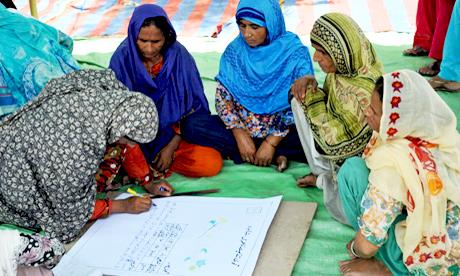Lead expert group paves way for improved global institutional and policy framework for rural women’s economic empowerment
FAO, the International Fund for Agricultural Development (IFAD), the World Food Programme (WFP) and UN Women convened an Expert Group Meeting from the 20-23 September 2011 in Accra, Ghana to identify strategies and recommendations to enhance the economic

© FAO/F. Naeem
23 September 2011, Rome - FAO, the International Fund for Agricultural Development (IFAD), the World Food Programme (WFP) and UN Women convened an Expert Group Meeting (EGM) on “Enabling rural women’s economic empowerment: institutions, opportunities, and participation,” 20-23 September 2011 in Accra, Ghana to identify strategies and recommendations to enhance the economic empowerment of rural women and inform the deliberations of the 56th Session of the Commission on the Status of Women.
Rural women play multiple critical roles in rural economies: they make up 43 percent of developing countries’ agricultural labour force and work as laborers, entrepreneurs, traders and providers of services in both the farm and non-farm sectors. They also spend long hours fulfilling household obligations including procuring and preparing food, rearing children and caring for the sick and elderly.
Yet, while these contributions play a key role in agricultural and rural development and food security, rural women continue to face discrimination that limits their access to decent work and productive resources including land, technologies and financial services, and that hampers their participation in decision-making at every level of society. Some legal systems also still do not guarantee equal rights for men and women, and national and local development initiatives and investment programmes do not always take their particular needs into consideration. These factors hinder rural women’s productivity and reduce their contributions to agricultural production and economic growth, aggravating rural poverty and hunger.
The current global food, economic and financial crises and the effects of climate change have heavily hit rural populations and brought renewed attention to the fact that the agricultural sectors of developing countries are underperforming, making it increasingly urgent to support rural women’s ability to realize their full potential to enable them to better contribute to food production and security.
 |
EGM participants included leading experts on gender, agriculture and rural development from the UN, academia and civil society. To see the full list of participants, click here. |
The EGM participants, comprising leading experts on gender, agriculture and rural development from the UN, academia and civil society from all regions of the world reviewed policies, practices, institutions and means of participation that have proven effective in promoting rural women’s economic empowerment and gender equality in order to come up with recommendations to enhance the economic empowerment of rural women. Discussions focused on rural women’s access to land and other productive resources, their role in natural resource management and climate change adaptation, and the effective institutions that can promote gender responsive rural development. All EGM recommendations and working papers will be made available in a few weeks on the EGM website and the FAO Gender website
These recommendations will serve to inform the work of the UN system and to assist UN Member States in their deliberations at the 56th Session of the Commission on the Status of Women, which will be dedicated to accelerating women’s empowerment in rural areas and supporting their role in poverty and hunger eradication, in development, and in mitigating current global challenges. The Commission is the principal global policy-making body dedicated exclusively to gender equality and advancement of women, which brings together UN Member States annually to evaluate progress on gender equality, identify challenges, set global standards and formulate concrete policies to promote gender equality and women's empowerment worldwide.
